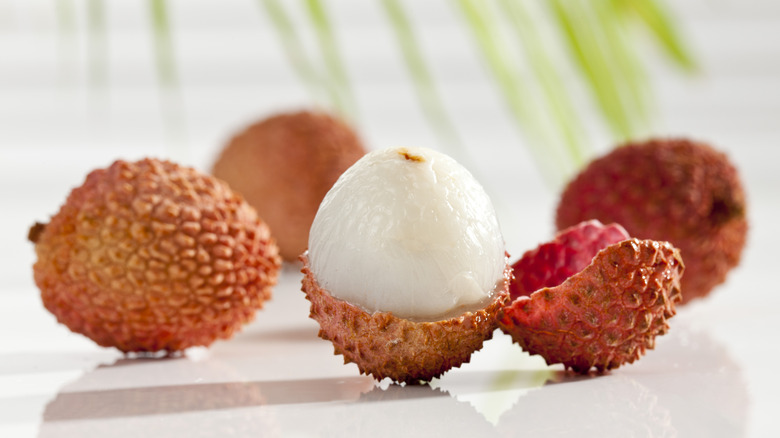The Underrated Fruit That Can Lower Cholesterol, Reduce Your Risk Of Blood Clots, And Prevent Cancer
You can't beat whole foods like fruits and vegetables to help prevent most chronic diseases. Fruits and vegetables provide phytonutrients that help your body punch out free radicals to achieve optimum health. Popular fruits like bananas, apples, and oranges can also form a tasty base for a healthy smoothie while giving you much-needed fiber to keep your digestive system running smoothly.
It also helps to experiment with other fruits that might have more phytochemicals or fiber than others. Kathleen Garcia-Benson, a registered dietitian at Top Nutrition Coaching, suggests adding lychee fruit to your antioxidant arsenal. "Lychees contain proanthocyanidins, a type of antioxidant that contributes to health," she said. "These compounds have been studied for their potential to help lower LDL cholesterol, which is associated with heart disease."
A 2015 study in PLoS One looked closely at the proanthocyanidins found in 32 types of lychees, finding that these powerful antioxidants are more easily absorbed by the body. Although lychees are a good source of vitamin C, the study found that the specific proanthocyanidins in lychees could fight oxidative stress just as well.
"Proanthocyanidins are also thought to support blood circulation and have anti-inflammatory properties, which could reduce the risk of blood clots," Garcia-Benson said. "Additionally, their antioxidant capabilities may protect cells from DNA damage."
The antioxidant power of lychees
The lychee (pronounced LEE-chee) fruit originates from China, but it's now grown in parts of Florida and Hawaii. You can identify lychees by their rough red skin, which, when peeled, reveals their white flesh on the inside. Lychees taste sweet but also have a hint of floral to them. In addition to vitamin C, a cup of sliced lychees provides 2.5 grams of fiber, 325 milligrams of potassium, and 12 milligrams of omega-3s. Lychees are also good sources of riboflavin and vitamin B6.
However, it's the proanthocyanidins that give lychees their secret power. According to a 2020 review in Molecules, proanthocyanidins can block the formation of blood vessels that allow cancers to grow and spread. They also cut off energy production in cancer cells and program their cell death. Proanthocyanidins prevent cancer growth by affecting the expression of genes while protecting DNA.
The review also noted that proanthocyanidins help your body break down fat while reducing harmful LDL cholesterol and boosting HDL cholesterol. These phytochemicals assist your body in converting cholesterol into bile acids to lower the cholesterol in your blood vessels.
A 2011 study in Molecular Medicine Reports additionally found that lychee extract reduced platelet clumping to prevent blood clots.
However, Garcia-Benson did urge caution in interpreting what these studies mean for human health. "Consuming lychees as part of a diverse diet could potentially offer health benefits, but their specific impacts require further study," she said.
Other health benefits of lychees
The antioxidants in lychees may be good for your heart, but fermented lychees could benefit your gut health and add to the antioxidant power. In a 2023 study in Food & Function, researchers fermented lychees with two probiotics, Lactobacillus plantarum and Lactobacillus rhamnosus. The fermentation process boosted the antioxidants catechin and quercetin in the lychees and helped these good bacteria grow. This means the body can better absorb these antioxidants for overall health.
Lychees are in season in the summer months, but some Asian markets might have them available. If you're lucky to find them fresh, Garcia-Benson says to peel off the hard skin and enjoy the white flesh, making sure not to eat the seed. You can also buy canned lychees in syrup on Amazon to enjoy year-round in your mocktails and smoothies. "They are also a flavorful addition to fruit salads, as they pair well with other tropical fruits," Garcia-Benson said.


